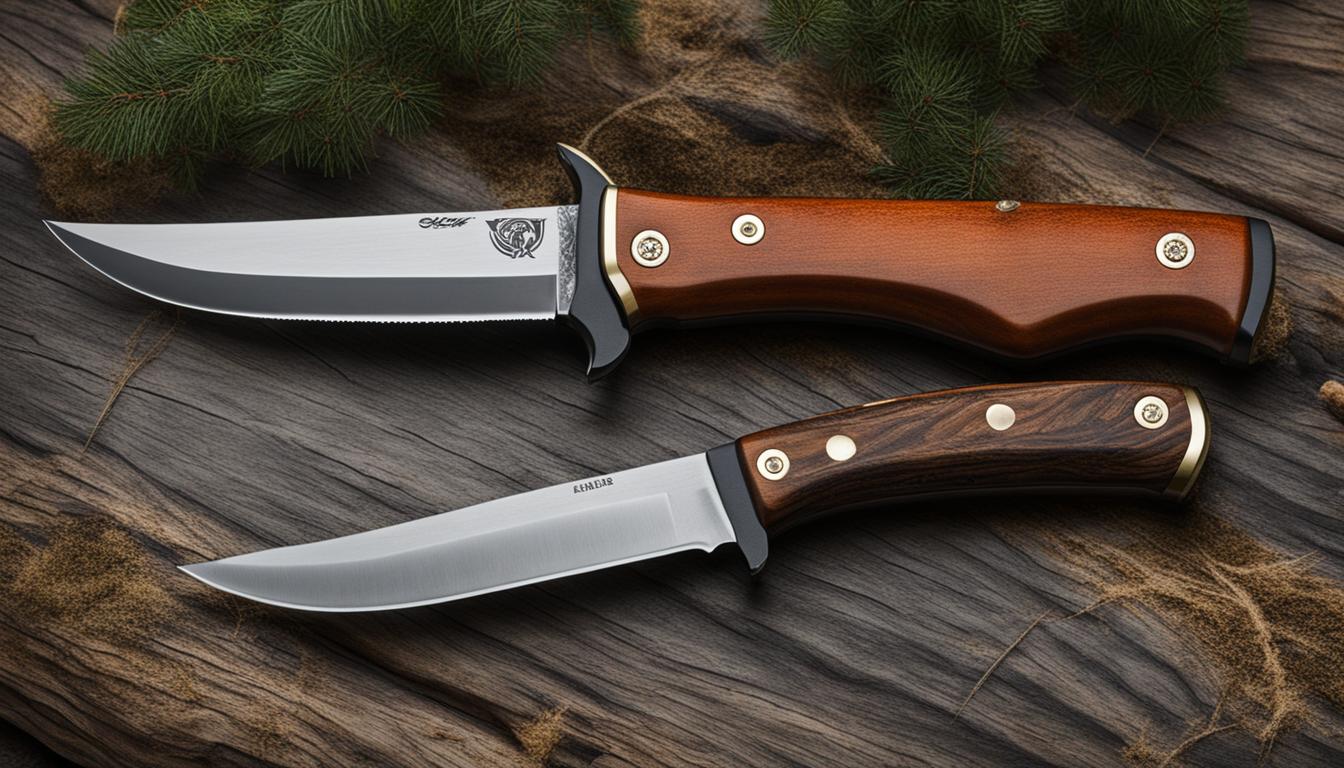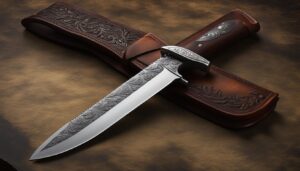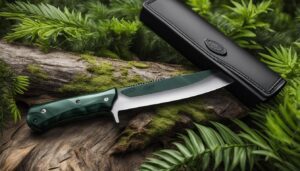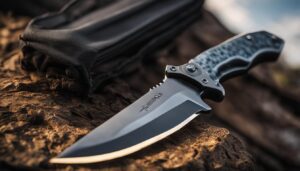Welcome to my article on the impact of weight on hunting performance and how to choose the perfect weight for your hunting knives. As a hunter, the weight of your knife plays a crucial role in your overall hunting experience. It affects your stamina, reaction time, and the effectiveness of your strikes. In this article, I will explore the influence of knife weight on hunting and provide valuable insights to help you make the right choice for your hunting needs.
Key Takeaways:
- Knife weight has a significant impact on hunting performance, including stamina and reaction time.
- Choosing the right balance between weight and length is crucial for precision and control.
- Longer and heavier blades may be advantageous in specific hunting scenarios.
- Assessing your physical capabilities is essential in determining the perfect weight for your hunting knife.
- Training, practice, and familiarity with your knife’s balance are vital for mastery.
The Origins and Evolution of the Boar Hunting Sword
Throughout history, the boar hunting sword has played a significant role in the hunting world. Its origins can be traced back to ancient civilizations, where early hunters realized the need for a specialized weapon to effectively hunt boars. The evolution of the boar hunting sword is a testament to the ingenuity and adaptability of humankind.
The history of the boar hunting sword is intertwined with the development of hunting techniques and the changing needs of hunters. Early boar hunting swords were typically short and compact, designed for close-quarters combat with aggressive boars. As hunting practices evolved, so did the design of the swords. Longer blades with a more pronounced curve emerged, providing hunters with increased reach and better control during the hunt.
Over time, the boar hunting sword became more than just a tool for hunting. It became a symbol of nobility and a reflection of the status of the hunter. Elaborate designs, intricate engravings, and exquisite craftsmanship adorned the boar hunting swords of the elite. These swords were prized possessions, not only for their practical use but also as a representation of power and prestige.
The evolution of the boar hunting sword continues to this day, with modern advancements in materials and technology. The design and construction of these swords have become more refined, ensuring optimal performance and durability. Today, boar hunting swords are crafted with precision, incorporating ergonomic handles and balanced weight distribution to enhance the hunter’s experience.
The Role of Length in Precision
When it comes to hunting boars, the length of a hunting sword plays a crucial role in achieving precision and control during a hunt. The ideal length of a boar hunting sword can vary depending on the specific hunting style and the size of the boars encountered. A sword that is too short may lack the reach required to fend off a charging boar effectively, while a sword that is too long may hinder the hunter’s agility and reaction time.
Throughout history, boar hunting swords have come in various lengths, each serving a specific purpose. Shorter blades are often favored for their maneuverability and close-quarters combat, allowing hunters to quickly strike at vital spots. On the other hand, longer blades offer increased reach, enabling hunters to keep boars at a safer distance and inflict deeper, more precise wounds for a swift kill.
Table: Comparison of Blade Lengths and Their Effects
| Blade Length | Effect |
|---|---|
| Shorter | Increased maneuverability and close-quarters combat |
| Longer | Greater reach and ability to keep boars at a distance |
It is important for hunters to assess their hunting environment and the size of the boars they typically encounter to determine the ideal length of their hunting sword. This will ensure optimal precision and control, allowing them to make accurate strikes and effectively neutralize any threats that may arise during a hunt.
The Science Behind the Weight
The weight of a hunting knife plays a crucial role in its overall performance and handling. Understanding the science behind knife weight can help you make informed decisions when choosing the perfect hunting knife. Weight directly affects a hunter’s stamina and reaction time, as well as the speed, agility, and striking force of the knife.
When it comes to hunting knives, the balance between weight and functionality is essential. The weight of a knife is determined by factors such as the material of the blade and handle, as well as the distribution of weight along the knife’s length. A well-balanced knife allows for smooth and precise movements, reducing strain on the hunter’s hand and arm.
Having a knife that is too heavy can cause fatigue over time, impacting the hunter’s ability to maintain control and accuracy. On the other hand, a knife that is too light may lack the necessary force and stability required for effective hunting. Achieving the ideal weight for a hunting knife involves finding the perfect balance between strength and maneuverability.
| Factors Affecting Knife Weight | Impact |
|---|---|
| Blade Material | Determines the overall weight of the knife. |
| Handle Design | Affects the weight distribution and balance of the knife. |
| Weight Distribution | Influences the knife’s maneuverability and control. |
When choosing a hunting knife, it is important to consider your personal preferences, physical capabilities, and hunting style. Testing different knives and finding one that feels comfortable and natural in your hand is key. Remember, the science of knife weight is about finding a balance that enhances your hunting performance and ensures a successful and enjoyable experience in the field.
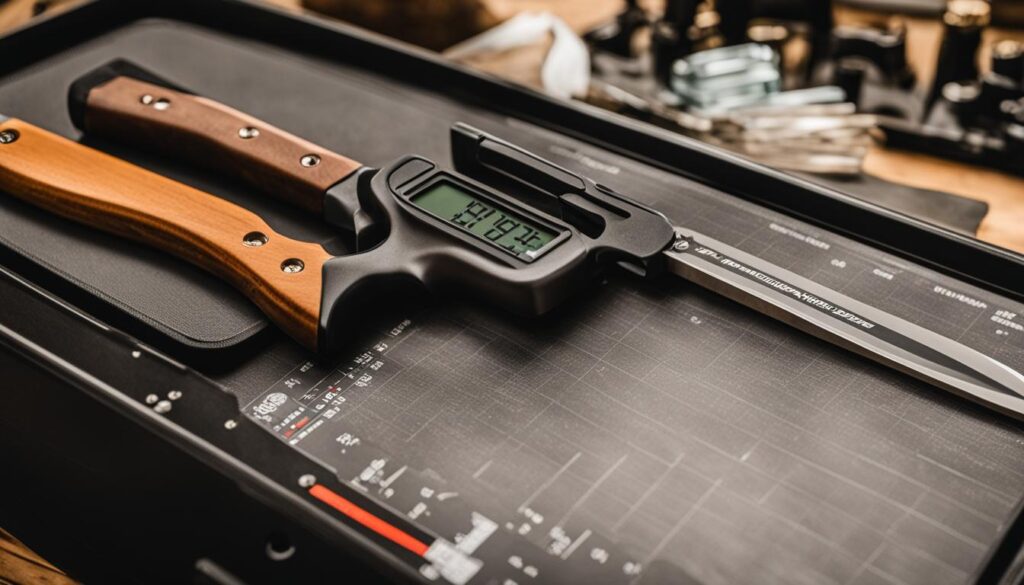
Advantages of Longer Blades: When to Choose Longer Blades
When it comes to boar hunting, choosing the right blade length can make a significant difference in your hunting performance. Longer blades offer several advantages in certain hunting scenarios, allowing you to effectively deal with larger boars and navigate open areas with ample space to maneuver.
Reach and range: One of the key advantages of longer blades is their increased reach. When facing a charging boar, a longer blade allows you to keep the animal at bay and create a safe distance between you and the boar. Additionally, longer blades provide a greater range for striking, enabling you to inflict deeper wounds for a swift and humane kill.
Consider the environment: It’s important to consider the hunting environment when deciding whether to opt for a longer blade. In open areas with fewer obstacles and more room to maneuver, longer blades can be highly advantageous. However, in tighter spaces such as dense forests or thick underbrush, longer blades may hinder your ability to navigate effectively and can get caught on vegetation or other obstacles.
Skill level and hunting experience: Another factor to consider is your skill level and hunting experience. Longer blades require greater control and technique to wield effectively, especially in close-quarters combat. If you’re an experienced hunter with a high level of proficiency, longer blades may be a suitable choice for you. However, if you’re a novice or less experienced hunter, it may be more prudent to start with a shorter blade and gradually transition to a longer one as you gain more skill and confidence.
| Advantages of Longer Blades | When to Choose Longer Blades |
|---|---|
| Increased reach | In open areas with ample space to maneuver |
| Greater range for striking | When dealing with larger boars |
| When you have a high level of proficiency and control |
In conclusion, while longer blades offer distinct advantages in certain hunting scenarios, it’s important to consider the hunting environment, your skill level, and your personal comfort and control in making your decision. Take the time to assess these factors and choose a blade length that aligns with your hunting needs and capabilities. Remember, training, practice, and familiarity with your blade’s balance are essential in mastering its use for successful boar hunting.
Situations Favoring Heavier Blades
When it comes to selecting the perfect hunting knife, considering the weight of the blade is crucial. While lighter knives offer benefits such as agility and ease of handling, there are situations where a heavier blade can be advantageous. Here are some scenarios where choosing a heavier blade can make a difference in your hunting performance:
- Dealing with Aggressive Boars: In encounters with particularly aggressive or larger boars, a heavier blade can provide the necessary thrust to quickly incapacitate the animal. The added weight enhances the striking force, increasing the chances of a swift and effective kill. It’s important to note that these situations require strength and stamina, as handling a heavier blade can be physically demanding.
- Hunting in Areas with Limited Mobility: In some hunting environments, such as dense forests or rugged terrains, maneuverability can be restricted. In these situations, a heavier blade can help compensate for the limited mobility by delivering more impact with each strike. The additional weight assists in penetrating the boar’s tough hide and inflicting deeper wounds, ensuring a successful hunt.
While heavier blades offer advantages in these specific scenarios, it’s essential to consider your own physical capabilities and hunting style. Practice and training are crucial in mastering the control and maneuverability of a heavier blade. Remember to assess the hunting environment and the type of boars you encounter to make an informed decision about choosing a heavier blade.
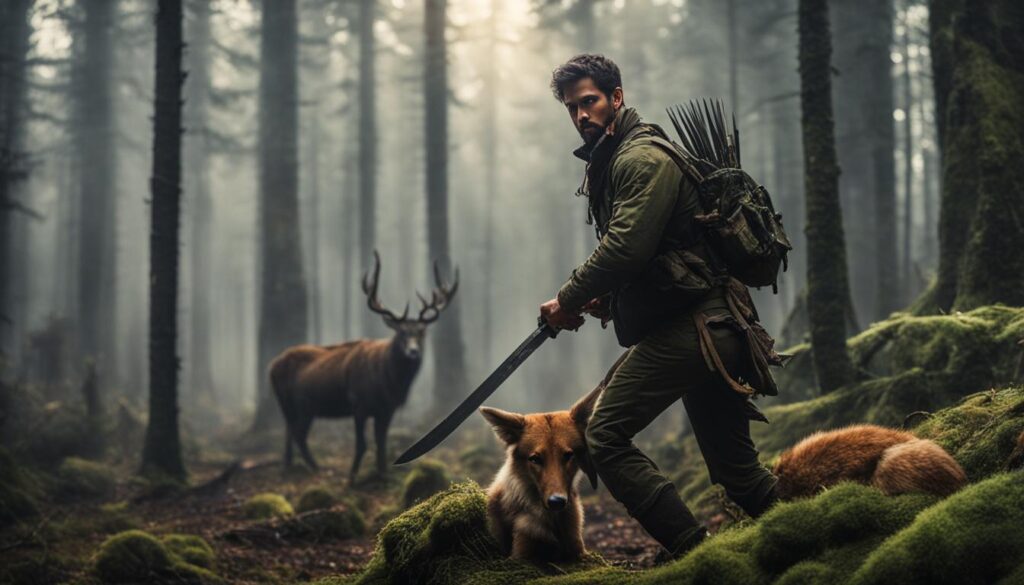

Example of heavy blade benefits:
| Scenario | Advantages |
|---|---|
| Dealing with Aggressive Boars | Increased striking force Improved chances of quick incapacitation |
| Hunting in Areas with Limited Mobility | Enhanced penetration through tough hide Deeper wounds for a swift kill |
“A heavier blade can give you the extra power you need to take down aggressive boars and make clean kills in challenging hunting environments. It’s important to find the right balance between weight and control, ensuring that you have the physical strength and stamina to handle a heavier blade effectively.” – Experienced Hunter
Determining Sword Balance: Finding Personal Comfort and Control
When choosing the perfect boar hunting sword, assessing your physical capabilities is crucial in determining the right balance between length and weight. Factors such as strength, agility, and personal comfort play a significant role in selecting a sword that feels like an extension of your arm and complements your hunting style.
Personal comfort and control are key considerations when it comes to finding the ideal sword. A sword that is too heavy or long may hinder your ability to maneuver swiftly, while a sword that is too light or short may lack the striking force needed to incapacitate a charging boar. It is important to strike a balance that allows you to maintain control and precision while also considering the demands of the hunting environment.
Finding the right balance often involves trial and error. It is recommended to handle different swords and assess how they feel in your hand. Pay attention to the weight distribution, grip, and overall ergonomics of the sword. You want to choose a sword that not only feels comfortable but also allows you to maintain control during intense hunting situations.
Factors to Consider for Sword Balance
When assessing your physical capabilities and determining sword balance, keep the following factors in mind:
- Strength: Consider your physical strength and endurance level. A heavier sword may require more strength and stamina to handle effectively.
- Agility: Evaluate your agility and mobility. A longer and heavier sword may limit your maneuverability in certain hunting environments.
- Comfort: Pay attention to how the sword feels in your hand. Ensure that the grip is comfortable and that the weight distribution allows for easy control.
“The right balance between length and weight can greatly enhance a hunter’s performance, providing the necessary control, power, and precision in every swing.” – Experienced Hunter
By assessing your physical capabilities and considering factors such as strength, agility, and personal comfort, you can make an informed decision when choosing the balance between length and weight in a boar hunting sword. Remember, finding the perfect balance is a personalized process, and what works for one hunter may not work for another. Take the time to handle different swords, test their balance, and select the one that feels like a natural extension of your arm.
| Factors to Consider | Weight | Length | Comfort Level |
|---|---|---|---|
| Strength | Consider your physical strength and endurance level. A heavier sword may require more strength and stamina to handle effectively. | – | Check if the grip is comfortable and if the weight distribution allows for easy control. |
| Agility | – | Evaluate your agility and mobility. A longer and heavier sword may limit your maneuverability in certain hunting environments. | – |
| Comfort | – | – | Pay attention to how the sword feels in your hand. Ensure that the grip is comfortable and that the weight distribution allows for easy control. |
Conclusion
In conclusion, the impact of weight on hunting performance cannot be underestimated. Choosing the perfect weight for your hunting knife is crucial in ensuring optimal performance and success in the field.
When considering the weight of your hunting knife, it is important to strike a balance between length and weight that suits your individual preferences and hunting needs. Personal comfort and control play a significant role in selecting the ideal weight for your knife.
In specific hunting scenarios, longer or heavier blades can offer advantages. Longer blades provide increased reach and the ability to keep the boar at bay, while heavier blades can deliver the necessary force to swiftly incapacitate the animal.
However, it is essential to remember that training, practice, and familiarizing yourself with the balance of your hunting knife are vital in mastering its use. By understanding the impact of weight on hunting and choosing the right balance, you can enhance your hunting performance and overall experience in the field.
FAQ
What is the impact of weight on hunting performance?
The weight of a hunting knife can significantly affect your performance. Heavier knives provide more thrust and can incapacitate animals quickly, but they require more strength and stamina to handle. Lighter knives are easier to maneuver but may lack the necessary force for certain hunting situations.
How do I choose the perfect weight for my hunting knife?
Choosing the perfect weight for your hunting knife depends on your personal preferences and hunting needs. Consider factors such as your strength, agility, and comfort level. It’s important to find a balance that allows you to maintain control and accuracy while using the knife.
What is the history of the boar hunting sword?
The boar hunting sword has a rich history dating back centuries. It was often associated with the elite and nobility and played a significant role in hunting boars. Over time, the design and materials used in boar hunting swords have evolved to meet the needs and preferences of hunters.
How does the length of a boar hunting sword affect precision?
The length of a boar hunting sword plays a crucial role in achieving precision and control during a hunt. A sword that is too short or too long can impact a hunter’s ability to fend off a charging boar. Longer blades provide better reach and range, but they may be less maneuverable in tighter spaces.
What is the science behind the weight of a boar hunting sword?
The weight of a boar hunting sword is determined by various factors, including the material, handle design, and weight distribution. Finding the ideal weight requires a delicate balance that affects the sword’s handling and performance. It’s important to consider the impact of weight on your stamina and reaction time.
In what scenarios would longer blades be more beneficial in boar hunting?
Longer blades are often more beneficial in open areas with ample space to maneuver or when dealing with larger boars. They provide better reach, allowing you to keep the boar at bay and inflict deeper wounds for a swift kill. However, longer blades may be less practical in tighter spaces or for hunters with limited skill.
When should I choose a heavier boar hunting sword?
A heavier boar hunting sword may be the right choice when dealing with particularly aggressive boars or hunting in areas with limited mobility. The additional weight provides the thrust needed to quickly incapacitate the animal. However, using a heavier sword requires strength and stamina, and it may not be suitable for all hunters.
How do I assess my physical capabilities when choosing a boar hunting sword?
When choosing a boar hunting sword, it’s important to assess your strength, agility, and personal comfort. A sword should feel like an extension of your arm and complement your hunting style. Finding the right balance between length and weight may require some trial and error based on your physical capabilities and the hunting environment.
